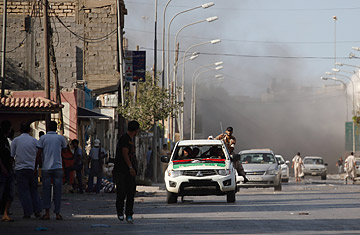
Libyan rebel fighters race down a street during artillery shelling close to a mosque between rebel fighters and forces loyal to Muammar Gaddafi on August 15, 2011, in the western town of Zawiyah.
For months I called him only "Mr. Utah," a reference to the years he lived in Ogden. The nickname helped us communicate in one of the most paranoid countries in the world: Muammar Gaddafi's Libya. But this week I picked up the phone, dialed Mr. Utah's number and said: "Hello, Taher!" The greeting might not sound like much. But in Libya, like much else these days, it is liberating.
When I first met Taher Belhaj, 59, in March, just a few weeks into the revolution, he barely said hello. We stood at our prearranged meeting spot in downtown Tripoli, while he scanned the narrow street, his eyes darting side to side, looking for signs of surveillance, before whispering, "Walk with me." So I did. For an hour, we wandered through the narrow lanes off what was then Green Square, as he whispered the terrifying details of his life in the oil-refinery town of Zawiyah, 30 miles west of the capital. "Mr. Utah" and I continued talking in low tones in a dark corner of a cafe downtown, where I ducked into the toilet several times, in order to scribble notes out of sight from prying eyes. His account, published on time.com — in which he was named Ahmed — was a rare first-hand description of the horrors which regular Libyans were experiencing as a result of Gaddafi's violent crackdown against the uprising.
During the week running up to our meeting, Gaddafi's forces had crushed a three-week revolt in Zawiyah, killing scores of people. Belhaj described the ghastly aftermath, where security forces moved through Zawiyah's streets, rounding up thousands of locals — he estimated about 5,000 — who the regime believed were rebel fighters or their supporters. Belhaj's account, of course, was drastically different from the reports Gaddafi officials fed foreign journalists while we were under strict lockdown in Tripoli's Rixos Hotel. Our minders twice drove us from Tripoli to Zawiyah to demonstrate that locals were celebrating the defeat of the rebels, who they said were foreign al-Qaeda operatives. Under Zawiyah's main square lay the bodies of several rebels shot during the town's final battle.
Desperate to protect his family, "Mr. Utah" made the riskiest move of his life that week. He sneaked into Zawiyah's hospital just Gaddafi's forces were rampaging through the corridors, looking for fighters. There, he smuggled out his injured son Ayoub, 19, who had been hit in the head with shrapnel from tank fire, when he was caught in the battle crossfire (Belhaj says his son was not himself a fighter). This week, Belhaj finally felt safe enough to allow me to publish those details. He had crept past Gaddafi's forces after they were in control of the hospital, he says. "In 15 minutes I smuggled out my son." Five months on, he says, he is still anguished over having left behind an injured young man lying in the next bed. "I just could not get a second man out," Belhaj says. Within hours, security forces "arrested everybody, the nurses, everybody," he said. "Until now I do not know what happened with them."
A few weeks later, after I had returned home, my telephone rang and a familiar voice said, "Hi, it's Mr. Utah." He had slipped out of Libya into Tunisia, transporting his injured son in his car in a frantic search for medical treatment for the teenager. At the time, he believed it was too dangerous to say how he had escaped Libya. This week, Belhaj said he had found an official he knew working for Gaddafi's border-control service, who supported the rebels and who secretly waved through his car with his injured son inside. Red Cross doctors in Tunis operated on Ayoub once, according to Belhaj, but his son will require one more operation to repair his skull. As yet, the family cannot afford the treatment.
Belhaj found himself unable to return to Zawiyah until last week, mainly because his son was too weak to travel, and he himself ran too great a risk of arrest. He sat out the war in Tunisia, one of countless thousands of Libyans who fled across the border during the conflict. He says he regularly ferried medical supplies from Tunis to Libyans trapped along the border.
For Belhaj — who was 19 when Gaddafi came to power — the revolt has shattered not only a dictatorship which he says he has always reviled. It has also allowed Libyans to rejoin the world, he says, after years of being shunned abroad. "It didn't matter who I met, the moment they heard I was Libyan they treated me with suspicion," says Belhaj, who lived in Utah for seven years during the 1980s. "We were victimized by Gaddafi, and we also paid a heavy price for it."
Last week, with the National Transitional Council finally having won the war, Belhaj finally drove his son home to Zawiyah — and to a new daughter, born to Belhaj shortly after he fled. The family house is pocked with battle scars, and the windows have been smashed. "We need building materials. There is too little food here. There is no medicine," he says. But, he says, he does not care. Returning to a Libya without Gaddafi is "like breathing fresh air. I cannot describe the feeling. It is like a big, big relief," he says. "We need some time to organize ourselves. But we are getting our lives back together."
